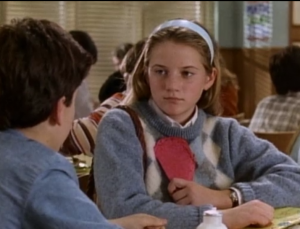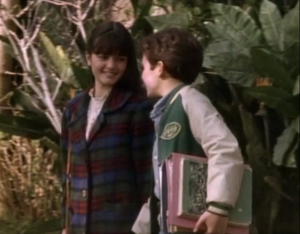There are two points of discussion following St. Valentine’s Day Massacre. First is the outcome of the episode and what it means for the show; I’ll get to that at the end of the recap. Second is the quality of the episode itself, to which I say: Meh. Color me disappointed.
I’ve described a few episodes of this show as “farcical” and “plot-heavy.” These descriptors fit this episode more than they ever have before, so let me take a moment to discuss exactly what I mean.
When I say an episode is “farcical,” I mean that it contains a lot of the traits of the theater genre of farce: mistaken identities, miscommunication, improbable coincidences, and otherwise unlikely scenarios. It’s not an inherently negative descriptor; a good farce can be extremely entertaining. But episodes that are too farcical have to be very funny and clever, because zany antics tend to overshadow things like “character stakes” and “motivation” and other aspects of good dramatic storytelling.
Consider St Valentine’s Day Massacre — one of the major subplots of the episode arose from a simple mistake of left or right. When the seventh grader put the note in the wrong locker, the locker ended up to be Becky Slater’s, and she of course misinterpreted it, etc. — that’s a potentially funny plot, but it has to be funny, or it doesn’t work. And, here, it’s not very funny.
And when I call an episode “plot-heavy,” I mean that characters’ motivations and intentions change rapidly through the episode. Over She, My Best Friend, and I and St. Valentine’s Day Massacre, Winnie’s favor of Kevin changes maybe a dozen times for different reasons — she’s jealous he’s trying to hook her up with Paul, then she resents Kevin for it and goes on a few dates with Paul, then her feelings for Kevin overcome her spite so she dumps Paul… etc.
These kind of rapid attitude changes can be very funny, particularly in a romantic context. But they can also be tiring; it’s just not as effective to have big changes in relationships over too short a timespan. For whatever reason, the writers of the show have tended to pair plot-heavy episodes back to back, as they do here, when they’d be a lot more effective evenly spaced.
Again, I don’t hate episodes that tend towards farce and rapid romantic plot changes. Steady As She Goes from the second season follows that formula and is one of my favorite episodes of the series. But Steady As She Goes does a few important things correctly that St. Valentine’s Day Massacre.
First, Steady As She Goes is very well grounded in believable character motivation even though it’s full of farcical hijinks. St. Valentine’s Day Massacre isn’t particularly grounded — we know Kevin wants Winnie, but a lot of the episode deals with his Becky Slater trouble, which really has very little to do with his desire for Winnie (except to complicate it even further).
Winnie is even more all over the place. I had trouble figuring out exactly why she was mad at Kevin at any point during the episode; at the end, she could have been mad that he kissed Becky, but instead she said that he’d embarrassed her. So I was even more confused.
Worst of all was the bit where she said she lied when she said she liked him, but later admitted that she had lied about lying. There’s nothing clever or character-based in that. It’s just a crappy excuse to keep the characters apart for another ten minutes.
Just Between Me And You… from the second season of the show was similarly exhausting in its copious miscommunications and deceptions. But that episode managed to redeem itself a little bit with an ending that the implied that the point of the episode was to show just how pointless all of that drama is.
St. Valentine’s Day Massacre had a hint of thematic purpose behind it. A few times throughout the episode, Future-Kevin made some remarks about how adolescent romance is made more difficult because so few people are direct, decisive, and honest. The resolution of the episode backs the theme up: Simply, Kevin tells Winnie how she feels, asks her if she feels the same. They apologize and start holding hands.
It could have been redemptive — the writers revealing the thematic point they were trying to make all along — but it mostly came across as empty and frustrating. Kevin and Winnie finally getting together is a MASSIVE plot point, one that I’d expect to be taken seriously and built up to. But this episode had the opposite effect: it bored me with romance and crushes. The moment where Kevin and Winnie get together felt like the non-punchline to an anti-joke.
There was one thing I really appreciated about the episode: the callbacks to plot arcs from previous episodes. Kevin’s crush on Miss White (or whatever he name is now) played a pivotal role in one scene, while Becky Slater was obviously a central figure of the plot. But the use of Becky in particular frustrated me and made me wish they hadn’t brought her up at all. What made her so appealing at the beginning was how the writers treated her as a character with emotions and motivations rather than just a plot device to keep Kevin and Winnie apart for awhile longer.
In short, St. Valentine’s Day Massacre frustrated me as an unfunny, unsatisfying episode that put concluded with the climactic moment of Winnie and Kevin apparently getting together. There are a few more parts of the episode that didn’t work for me — including Paul’s apparently nonexistent memory that he got dumped by Winnie for Kevin — but I think I’ve made my point.
So now, a few thoughts on what a Kevin-Winnie romance might mean for the show. First, I think the writers picked a good point in the series to finally hook the two up. They’d run out of excuses to feasibly keep them apart and explored plenty of courtship stories. I’m ready to see some actual relationship stories.
My biggest concern is that the writers will bail to quickly on the relationship for any number of reasons (the show is on Moonlighting Fallacy watch). I’ve tricked myself into watching this show as if it were currently airing, but I do have the advance knowledge that show runs for six seasons; if it breaks Winnie and Kevin up too early, I might start to dread the inevitable will-they-won’t-they cycle knowing I have to put up with it for another eighty or so episodes.
On the more optimistic side, I’m really excited to see what The Wonder Years has to say about all phases of a romatnic relationship during formative years. A first serious relationship is one of the most meaningful, educational experiences of anyone’s life. There’s a lot of poignant material for the show to deal with. And I won’t even mind an occasional silly, farce episode, as long as they don’t have lasting consequences and manage to actually be funny.
I just really, really hope the writers take their time telling these stories. If they handle this correctly, it could add a powerful dimension to the show. If they botch it, it could seriously hamper the show for seasons to come by wasting a central conflict carefully constructed over two and a half seasons of great television. No pressure or anything, though.






